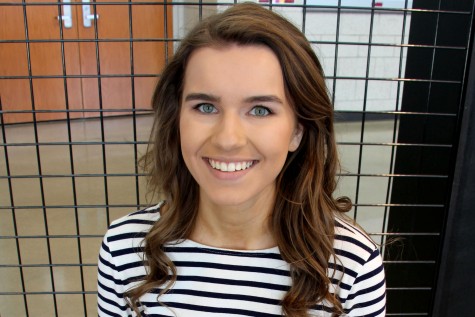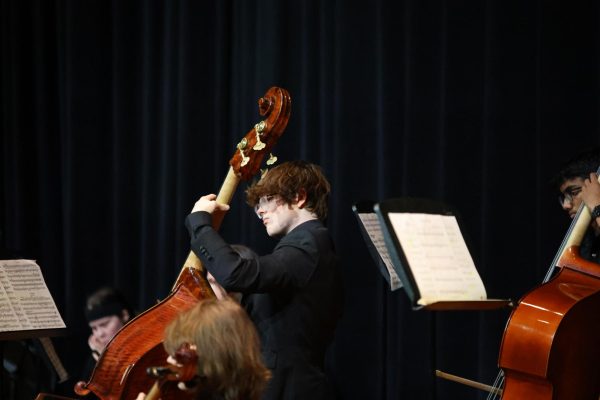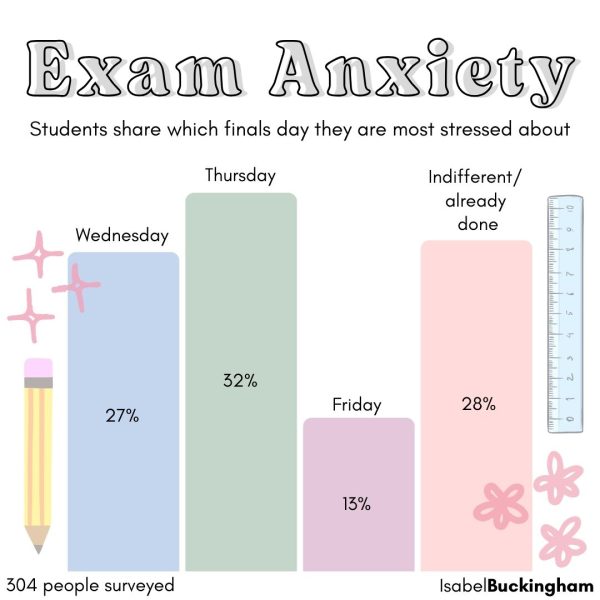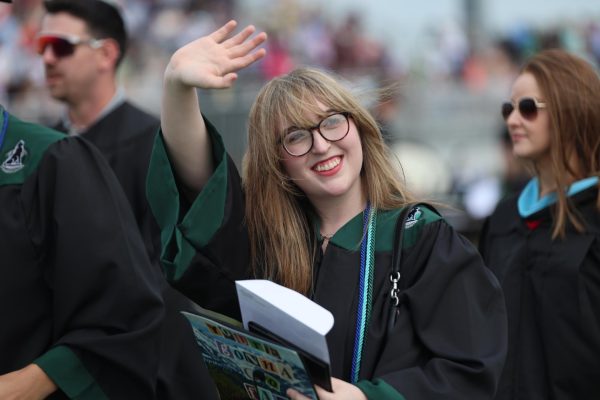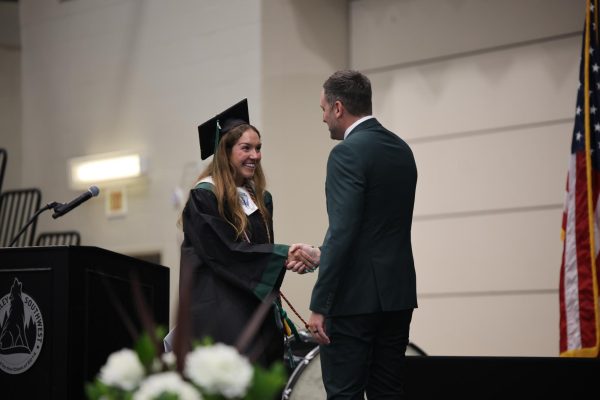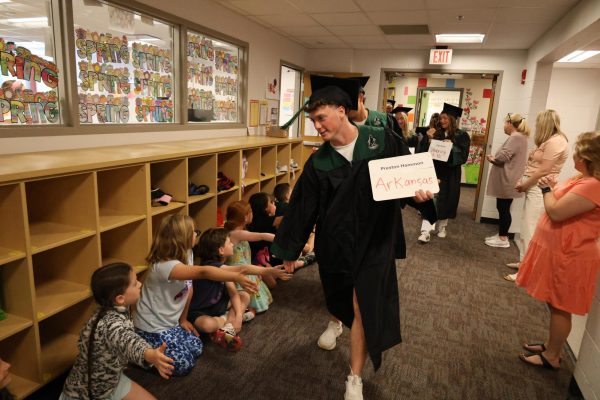Students prepare to graduate early
When senior Rylee Brown moves the tassel to the left side of her cap at graduation, it won’t signify the entry of a newfound phase of independence in her life — a phase filled with the anticipatory excitement of starting college at the end of summer. When Brown walks with the class of 2016, she will just have completed final exam week of her first semester of college.
Even though Brown will return to walk with her graduating class in the ceremony, Brown will have already received her diploma five months earlier, as she plans on graduating at the end of first semester. After Brown finishes her first semester final exams, she will have just over three weeks until she begins classes at the University of Kansas, where she plans on majoring in chemistry and potentially film.
Brown made the decision to graduate early during the fall semester of her junior year. Although she was originally planning on completing her senior year through online school, Brown realized with the help of counselor Kristi Dixon that finishing high school in a social environment was her best option.
“Junior year I had so much going on that I had no idea what to do — I was always sick; I didn’t want to go to school,” Brown said. “[Dixon] helped me realize that not only did I need to suck it up and go to school, but I also needed to find different ways that would help me like school better, and looking forward to something like graduating early helped out with that.”
Counselor Kevin Halfmann said students want to graduate early for a variety of reasons, whether that be to start college early, work or simply because they do not enjoy high school. Halfmann said the counseling department never recommends that a student graduates early. However, it does help those interested in taking alternative routes their second semester senior year explore their options.
“There are people who are ready to go, so if a person is truly ready for the next step and they have a good plan in place and have the maturity and academic skills, that’s great,” Halfmann said. “I’m still skeptical that there isn’t more that could be accomplished in high school for almost everybody. There are very bright people working very hard in very challenging classes all the way to the end, so I think that there’s a lot to be gained by doing that.”
In order to meet the graduation requirement of earning four credits of English classes, Brown is enrolled simultaneously in ELA 12 and online Contemporary Communications, which is equivalent to second semester ELA 12. Brown said the modifications she’s had to make to her schedule haven’t been difficult to adjust to and what she’s learning in ELA 12 is often congruent to the material she is learning in online Contemporary Communications.
Even though graduating early has been a fairly easy process for some students, Halfmann said convenience shouldn’t encourage students to graduate early. He said there is still benefit in completing four full years of education and taking advantage of classes that prepare students for college and the workplace.
“When a school is designed, you plan the curriculum in the school — that curriculum goes for 13 years,” Halfmann said. “There are skills and awarenesses that you want everyone to have as you go through, and that’s one of the things that happens when you short circuit the process — you don’t finish all that. The fact of the matter is, the less education you have the less you know, and so those are the kind of things that become more a problem. You just don’t have the chance to learn as many things as you could learn.”
Alumnus Hailey Weston, a sophomore business major at the University of Oregon, said graduating a semester early allowed her to build a sense of maturity that she would not have been able to develop if she was in high school second semester. After graduating in December 2013, Weston moved to Bend, Oregon to work. Weston said she initially missed the atmosphere of high school and her friends, but working allowed her to build her independence.
“I had time to figure out who I was, and I had time think about where I want to happily spend the next four years of my life,” Weston said. “Oregon was that happiness and independence that I had always sought in high school. Graduating early is such a positive thing, and many people don’t really think about the benefits that it can bring. It gave me such a positive, independent, fulfilling feeling inside knowing that I could finally start my life studying something that I am very interested in and meet amazing new people along the way.”
Halfmann said each year, only a handful of students will graduate early. Junior Anne-Marie Dahms is taking the even less-typical route of graduating a full year early. Dahms plans to spend her senior year studying abroad in a French-speaking country. She said she wants to be a French language teacher, and she hopes to apply her experiences from studying abroad to teach others about international cultures.
Dahms is enrolled in four Advanced Placement classes, including both AP English Language and Composition and AP English Literature and Composition. In addition, she is enrolled in online Physical Education and takes 25 hours of ballet classes a week. On a typical night, Dahms is awake until midnight finishing homework.
“I have slightly [considered not graduating early because of the stress], but whenever that happens, I think of all the fun stuff to happen,” Dahms said. “I feel like I’ll be letting myself down if I didn’t [graduate early] now that I’m already invested. I’ve invested so many people into it that I don’t want to let them down.”
Dahms said that when she met with Dixon to modify her schedule, Dixon expressed concern that Dahms would be missing out on a vital year of social development. However, Dahms said while she thinks there’s value in being academically smart, she think it’s equally as important to be culturally smart.
“I will be missing out, but I also feel like I will have different experiences than my classmates will have,” Dahms said. “I think it’s a win-lose situation where I get more experiences, but I also lose social experiences of high school.”
Halfmann said in addition to missing out on traditional experiences of being a high school senior, he worries that students who graduate early will not be prepared for succeeding in college classes. According to TIME Magazine, on average, it takes a college student six years to complete a four-year degree. Halfmann said not receiving four full years of high school education makes students more likely to fall victim to this statistic.
“There’s a big complaint by colleges that high schools don’t send people to them that are ready to succeed,” Halfmann said. “We want to make sure that whoever leaves here is ready to crush wherever they go next, and we can best do that if people are with us for the full four years.”
Brown said she thinks she is prepared at both an educational and a maturity level to start college. She said she isn’t worried about missing out on an extra semester of education since if she had chosen to stay in high school second semester, the only classes on her schedule would be ELA 12 and film courses at the Center for Advanced Professional Studies.
“I won’t be sitting around for another eight months,” Brown said. “If I didn’t take online [Contemporary Communications], which is what I’m doing right now, I’d be sitting around bored, wishing that I was at college. I get tired of high school drama so I’m ready to be out of that area.”


